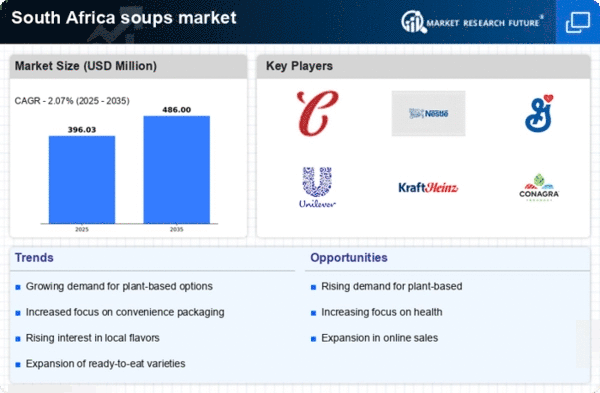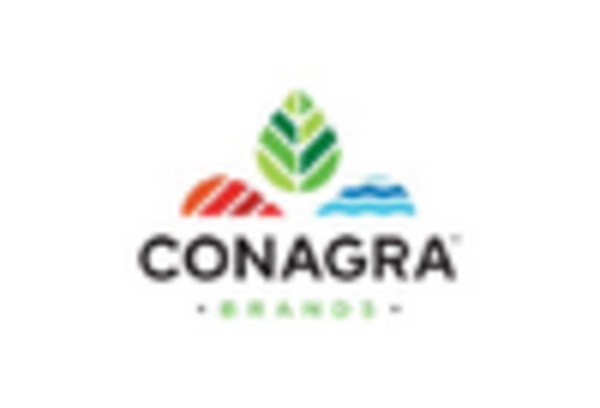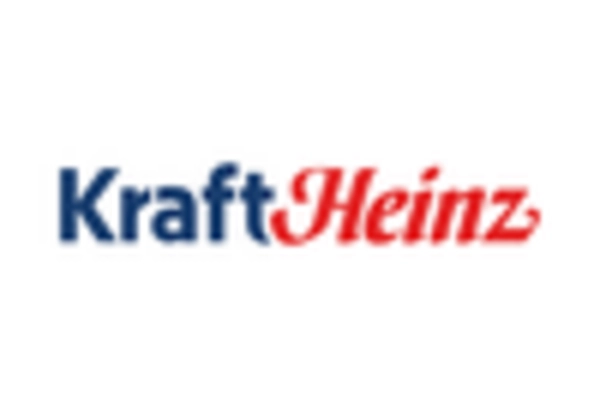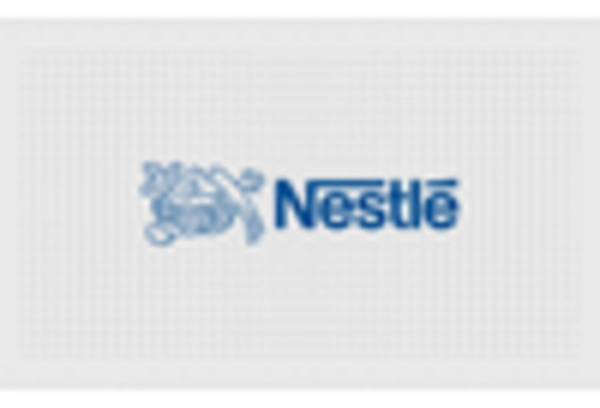Expansion of Retail Channels
The expansion of retail channels in South Africa is significantly impacting the soups market. With the rise of modern retail formats, including supermarkets and online grocery platforms, consumers have greater access to a variety of soup products. This increased availability is likely to drive sales and encourage trial among consumers who may not have previously purchased soups. Data indicates that the retail sector has seen a growth of approximately 10% in the last year, with online sales contributing notably to this trend. As retailers continue to diversify their offerings and enhance the shopping experience, the soups market stands to benefit from increased visibility and accessibility, potentially leading to higher consumption rates.
Rising Demand for Convenience Foods
The increasing pace of life in South Africa has led to a notable rise in the demand for convenience foods, including the soups market. Consumers are increasingly seeking quick meal solutions that require minimal preparation time. This trend is particularly evident among busy professionals and families, who often prioritize convenience over traditional cooking methods. According to recent data, the convenience food sector has experienced a growth rate of approximately 15% annually, with soups being a significant contributor. The soups market is thus positioned to benefit from this shift, as ready-to-eat and instant soup options become more appealing to time-strapped consumers. As a result, manufacturers are likely to innovate and expand their product lines to cater to this growing demand, further solidifying the market's presence in the food industry.
Sustainability and Ethical Sourcing
Sustainability has emerged as a pivotal concern for consumers in South Africa, influencing their purchasing decisions in the soups market. There is a growing expectation for brands to adopt ethical sourcing practices and environmentally friendly packaging. Consumers are increasingly inclined to support companies that demonstrate a commitment to sustainability, which is reflected in their purchasing behavior. Recent surveys indicate that approximately 60% of South African consumers are willing to pay a premium for products that are sustainably sourced. This trend is prompting manufacturers to reevaluate their supply chains and adopt practices that align with consumer values. As a result, the soups market is likely to see a rise in products that emphasize sustainability, appealing to a conscientious consumer base.
Increased Focus on Nutritional Value
In South Africa, there is a growing awareness among consumers regarding the nutritional value of food products, which significantly impacts the soups market. Health-conscious individuals are increasingly scrutinizing ingredient lists and seeking soups that offer health benefits, such as low sodium, high fiber, and added vitamins. This trend is reflected in the market, where products that emphasize nutritional content are gaining traction. For instance, soups fortified with superfoods or organic ingredients are becoming more popular, appealing to a demographic that prioritizes health. Market data indicates that the segment of health-oriented soups has seen a growth of around 20% in recent years. Consequently, manufacturers are adapting their offerings to align with these consumer preferences, thereby enhancing their competitive edge in the soups market.
Cultural Influences on Flavor Preferences
Cultural diversity in South Africa plays a crucial role in shaping consumer preferences within the soups market. The country's rich culinary heritage influences the flavors and ingredients that resonate with consumers. Traditional soups, often made with local ingredients, are experiencing a resurgence as consumers seek authentic tastes. This cultural inclination towards familiar flavors is driving innovation in product development, with brands introducing new varieties that reflect local tastes. Market analysis suggests that soups featuring indigenous ingredients are gaining popularity, potentially increasing market share. As a result, companies are likely to invest in research and development to create products that cater to these cultural preferences, thereby enhancing their appeal in the soups market.
















